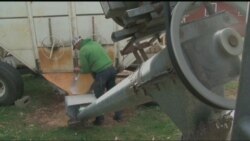There was a time when Tracy Warner had everything she needed - and wanted - thanks to the middle class wages from her job at Galesburg, Illinois's Maytag manufacturing facility.
“We weren’t there just for the money,” she said. “We were there to be a part of something. At least I was. My dad worked there, his wife, my aunt and uncle worked there, my friends."
She recalled her job was “hard, strenuous,” but it was easy to see the fruits of her labor rolling off the assembly line. The most rewarding part of the work was “to have my name on making things, and be a part of the finished product.”
Warner took pride in the knowledge her labor made possible the refrigerator that chilled milk or froze ice cream treats in kitchens throughout the United States.
But Warner’s job, along with about 1,500 others left the country when Maytag moved to Reynosa, Mexico in 2004. Workers in Galesburg earned about $15 an hour. In Reynosa, workers made about $1 an hour, a considerable savings for the company.
“I’m resentful,” said Warner, who spent 15 years working for Maytag. “I put my time in there. I really thought I was going to retire from there.”
The closure also shocked the surrounding communities who depended on the plant for income and business.
The factory is now an empty shell, a sprawling reminder of Galesburg’s past prosperity, and what it lost.
Retirement deferred
“It’s hard because of the aspect of pride,” said former Maytag worker George Carney. “When you used to be able to go out and get your hand on things and were proud of what you made.”
He said that when Maytag pulled out of Galesburg, his retirement plans were over. He hoped to make a new start.
He took some of his severance money and bought a tavern near Galesburg. But with less people making less money in the area, the bar was not as profitable as he had hoped.
“It was kind of a whiplash effect to that,” he said, referring to the spreading impact of Maytag’s departure. “Everyone kind of has to pinch pennies. I ended up selling the bar... because I was ending up sinking lower and lower in the hole.”
He is still unemployed. Carney blames the 1994 North American Free Trade Agreement, or NAFTA, for taking away the job he held for 21 years, and for changing the place he called home.
“When you lose all your jobs from the same plant, and everything goes across the border, you kind of got to think that NAFTA is the problem,” said Carney.
NAFTA
Maytag “was the economic anchor of Galesburg,” explained University of Chicago Senior Lecturer Chad Broughton. In 2004, when the company left Galesburg, Broughton was teaching there at Knox College.
Since that time, he has studied the pain the plant closure inflicted on Galesburg. That research became the basis for his 2015 book, Boom, Bust, Exodus – The Rust Belt, The Maquilas, and a Tale of Two Cities.
Broughton believes the beginning of the end of the Maytag plant in Galesburg started with the 1993 signing of NAFTA.
“Basically it shifted the playing field, NAFTA did, in favor of corporations and created incentives to move to Mexico,” he explained. “There is a study from 1996 that shows that 50 percent of companies used NAFTA as a bargaining tool in some way, like the threat of moving to Mexico."
Broughton said when NAFTA was implemented in 1994, Maytag threatened to leave. "And they got all these concessions from the state of Illinois and the city totaling something like $7.5 million,” said Broughton.
But the concessions were not enough to keep Maytag in Galesburg permanently. Broughton said the costs to the city are still being calculated.
“They lost a $60 million payroll; they lost tax revenues for the city. And there is the indirect cost to local business. Really, everybody in that town, it is a town of about 34,000 people, was connected in one way or another to that factory,” he said.
TPP
Broughton doubts the pending Trans-Pacific Partnership (TPP) agreement, of which many details are still unknown, will be any different.
“Obama promises that the TPP will be different from NAFTA, that it will improve workers' standards by having enforceable mechanisms in those countries like Vietnam and Malaysia, but that has yet to be seen and I am skeptical frankly that those provisions will be in there,” he said.
The AFL-CIO Labor Union blames NAFTA with the loss of as many as 700,000 U.S. jobs since it went into effect in 1994.
Today, Tracy Warner works twice as many hours working two jobs to make just over half of what she earned at Maytag. She too, has doubts about the TPP.
“It’s a betrayal to the American worker,” she said.
Warner is not alone. U.S. ratification of the TPP agreement faces opposition in Congress, and among presidential candidates on the campaign trail, including former U.S. Secretary of State Hillary Clinton.
Good for agriculture
As the debate over the TPP continues, there are those who live near Galesburg eagerly awaiting its implementation.
One of them is Monmouth, Illinois farmer Wendell Shauman.
“NAFTA was really good for agriculture,” he said. “There’s other parts of the economy that you worry about, but for agriculture, the more free trade agreements we got (sic) the better off we’ll be.”
Shauman is the former chairman of the U.S. Grains Council marketing group. He represented U.S. farmers on several trips to Asia before TPP negotiations began.
Shauman said he can’t directly outline how NAFTA helped his individual farming operation, other than to provide a bit more certainty there is demand for his product.
“I’m basically all for it,” farmer Monty Whipple said of the TPP.
He’s hoping his harvests of corn and soy beans will reach new markets and customers. “It’s a global world. We are no longer isolationist where we just produce our own products and keep them here.”
Whipple understands he’s not the only supplier in the global village. “I think it behooves us to be a part of the game and reach agreements with these people so they come to us instead of looking elsewhere for their products.”
Shauman said he understands why those who live in and around Galesburg point the finger at NAFTA, but adds there is a greater history lesson to remember. “You go back to the Depression, one of the big reasons that got as bad is it did was everybody put up the walls and tried to isolate themselves and protect our markets - and it caused the whole world to collapse,” said Shauman.









